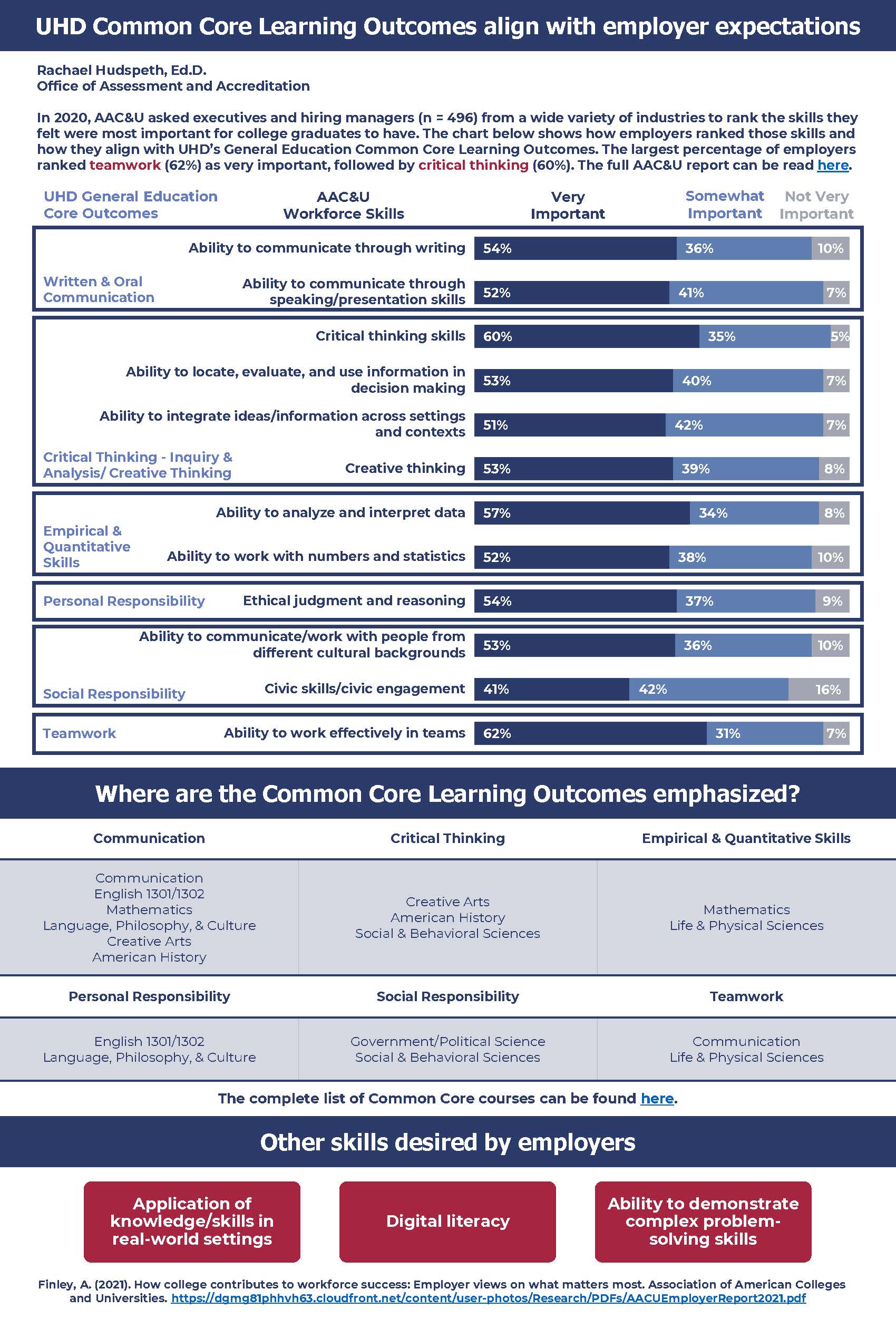Value of the Common Core to Employers
Strengthening Our Core
UHD’s Core Curriculum Aligns Student Outcomes With Employer Wish List
In 2020, the American Association of Colleges & Universities (AAC&U) asked executives and hiring managers to rank the educational outcomes and experiences they valued most when making hiring decisions. At UHD, the General Education Committee (GEC) is working hard to ensure UHD students graduate with those outcomes and experiences.
One of the first phrases every incoming UHD undergraduate learns is “Common Core” – shorthand for the UHD General Education Common Core Curriculum. UHD’s Common Core is a set of 42 course hours students must take from a specific suite of disciplines, including English, Communication, Mathematics, Natural Sciences, History, Government, Creative Arts, and Social Sciences. The learning outcomes of the courses offered under each discipline are designed to map to Texas’ Core Objectives.
The team of faculty and staff charged with overseeing and assessing the Common Core is less widely known. The GEC comprises faculty members from across the University and works in tandem with UHD’s Office of Assessment & Accreditation (OAA).
“The purpose of UHD’s Common Core is to provide students with the foundation for a well-rounded undergraduate education regardless of the pursued major,” explained Dr. Eszter Trufan, Chair of the GEC and Associate Professor of Chemistry. “The Gen Ed Committee is charged with overseeing the curriculum in the Core and ensuring that Core courses prepare students for success in both their academic and professional careers.”
Dr. Lea Campbell, the Executive Director of OAA and a standing member of the GEC for more than a decade, agrees. “One goal of the Gen Ed program at UHD is to provide students with experiences that define what it means to be a college-educated person,” Campbell said. “The Common Core provides an educational foundation that will both support student success in higher-level courses and facilitate students graduating with the core knowledge expected of anyone who earns a college degree.”
Students’ academic career at UHD begins with a freshman or transfer seminar. These discipline-based courses, developed by some of the University’s most creative faculty, are designed to help students develop academic success strategies and a sense of community, engage with UHD faculty, and refine academic and career goals through coursework organized around unique and interesting academic topics.
As students move through the Gen Ed curriculum, they can select courses from as many as 25 different disciplines, most of which are affiliated with an undergraduate degree.
“The Common Core exposes students to different UHD degrees and related career options,” Trufan said. “Our students are highly focused on having a professional career, and they see a college education as the primary strategy to achieve that objective. Aligning our curriculum and student outcomes with skills employers value, like those identified in the AAC&U report, will help UHD students achieve their academic and professional goals.”
The chart below, prepared by OAA’s Dr. Rachael Hudspeth, illustrates how UHD’s Gen Ed program lines up with the educational outcomes and experiences identified in the AAC&U report as those that matter most to executives and hiring managers. (Click on the graphic for a large-sized version with more details. Study source: Finley, A. [2021]. How college contributes to workforce success: Employer views on what matters most. Association of American Colleges and Universities.)
The second focus for the GEC and OAA assessment. “Evaluating the Common Core is as important as selecting the courses included in it,” Campbell noted.
Scholar Dr. Tia Brown McNair, who presented “Inclusive Excellence, the Way Forward: Student Success & Equity Part II” last spring as part of the UHD President’s Lecture Series, identified several tactics UHD could use to help students succeed. One of those tactics was to “ensure students are learning.” That’s where assessment comes in.
“The only way to ensure students are actually learning the skills and knowledge they need is to systematically evaluate their academic work,” Trufan said. “Each year, a group of faculty members assesses student progress on three or four of UHD’s Core Outcomes using rubrics to score a sample of their projects. We share the results with faculty across the Colleges, who use the information to determine how best to continue to improve student learning.”
The GEC and OAA also work to improve student outcomes in the core areas by providing faculty development opportunities. Most recently, Dr. Katharine Jager, Professor of English, and Dr. Joseph Cunningham, Assistant Director of the Academic Center, worked with the GEC to develop a new microcredential (a specialty certification) on writing in the disciplines for faculty. The GEC is also sponsoring a fall workshop on aligning outcomes and curriculum that will be led by a Fellow from the National Institute for Learning Outcomes Assessment.
“Student success means preparing students for the next step in their career, whether it’s to hit the ground running at a job immediately after graduation or to successfully pursue a higher-level degree that will one day result in a job,” Trufan said. “UHD’s Common Core foundation will serve them equally well on either path.”
This article was original published in UHD News.

